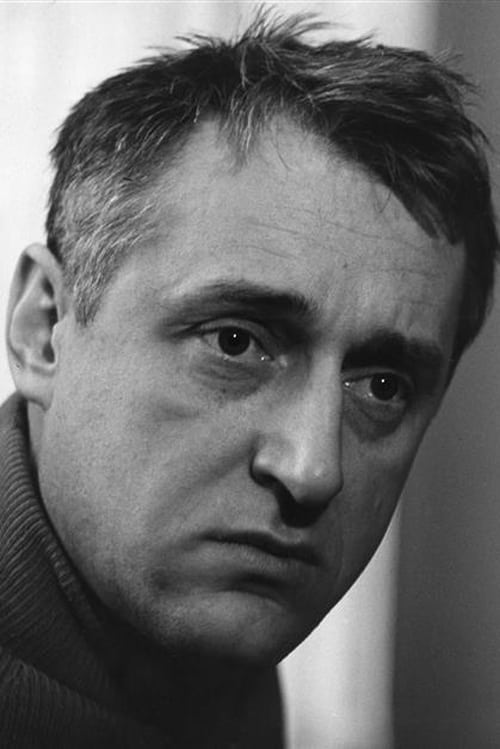Evald Schorm
Nacimiento : 1931-12-15, Prague, Czechoslovakia [now Czech Republic]
Muerte : 1988-12-14
Historia
At one time, Czech director Evald Schorm was known as "the conscience of the Czech New Wave" and was known for using film to promote notions of compassion, equality, and individualism in the face of social structure. Originally an opera singer, the Prague native studied filmmaking at the prestigious F.A.M.U. between 1957 and 1962. He went on to create documentaries with the Documentary Film Studio in Prague. Schorm also worked as a film actor. Following the Soviet invasion of Czechoslovakia, the Communist government repressed his films. Still, Schorm remained in Czechoslovakia and directed opera, stage plays, and sometimes television shows. He returned to feature filmmaking in the late '80s, but died of heart failure in 1988.

Adaptation
Dostoevsky’s latter-day opus about the siblings and their father is among the masterpieces of world literature. It asks profound questions about ethics and religion. Is there a God? Does the devil exist? Is everything allowed because we live in a world without morality? And if so, does patricide even constitute a crime? One of the most interesting adaptations of the material is The Karamazovs by Czech director Petr Zelenka. We witness a group of thesps from Prague on a trip to Krakow in Poland to stage the novel as a play in a derelict steelworks as part of the Closer to Life Festival. The project, however, is born under the bad sign, apparently doomed from the start. When they arrive, the roof is about to cave in, so that the actors are told to wear safety helmets. Their sole consistent audience is a laborer (Andrzej Mastalerz) who rather follows each dress rehearsal than watching over his seven-year-old son who has suffered a tragic accident in the factory.

Screenplay
An allegory set in an archetypal Czech village, it tells of what happens when a sequence of mysterious events take place, including the disappearance of the stationmaster. While everything has a rational explanation, collective paranoia takes hold and everyone’s worst instincts are released. Interrogations, the abolition of rights and the search for scapegoats ultimately lead to murder

Director
An allegory set in an archetypal Czech village, it tells of what happens when a sequence of mysterious events take place, including the disappearance of the stationmaster. While everything has a rational explanation, collective paranoia takes hold and everyone’s worst instincts are released. Interrogations, the abolition of rights and the search for scapegoats ultimately lead to murder

Director
Showing his own original footage of Prague Spring, director Evald Schorm describes the atmosphere these days in 1968.

Director
An overprotective mother plagues her daughter out of guilt over unintentionally scarring her daughter's cheek.

Frantisek
The story of a music academy student Zdenek, who meets a charming girl, and without realizing also gets a son with her. Dealing with such a situation is not easy, especially when one day the child's mother disappears. Twenty year old Zdenek faces a serious decision. Although he is aware that a child may endanger his studies and perhaps even future career, he refuses to entrust him to the care of the state institution.

Professor
The story of a music academy student Zdenek, who meets a charming girl, and without realizing also gets a son with her. Dealing with such a situation is not easy, especially when one day the child's mother disappears. Twenty year old Zdenek faces a serious decision. Although he is aware that a child may endanger his studies and perhaps even future career, he refuses to entrust him to the care of the state institution.

Hugo Jílek
A twelve-year-old is looking for his biological parents after discovering the fact that he was adopted.

Screenplay
Study of the work of the conductor Václav Neumann and his creative process with the orchestra.

Story
Study of the work of the conductor Václav Neumann and his creative process with the orchestra.

Director
Study of the work of the conductor Václav Neumann and his creative process with the orchestra.

Rezsõ úr
Mr. Dezső and Rezső are selecting the heroes for their new operetta. They represent different tastes and styles, and keep arguing about the casting of the four boys and four girls.

Director

Director

Screenplay
Prague - mystical city. It was here in the Middle Ages, alchemists and magicians gathered. Rumor has it that the house of Prague hide secret obtain the philosopher's stone, and complex multi-level labyrinth of underground tunnels and cellars keep many unsolved mysteries and untold treasures. Prague just full of ghosts and phantoms. Let us slightly lift the veil that hides the secrets and little to satisfy your curiosity, get acquainted with some legends of Prague.

Director
Prague - mystical city. It was here in the Middle Ages, alchemists and magicians gathered. Rumor has it that the house of Prague hide secret obtain the philosopher's stone, and complex multi-level labyrinth of underground tunnels and cellars keep many unsolved mysteries and untold treasures. Prague just full of ghosts and phantoms. Let us slightly lift the veil that hides the secrets and little to satisfy your curiosity, get acquainted with some legends of Prague.
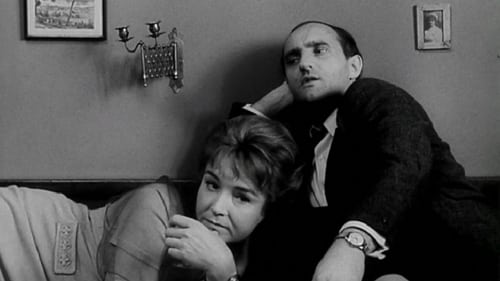
Kostka
Ludvik Jahn, director de un instituto científico, descubre que Helena, una periodista de radio, es la esposa de Pavel, un ex compañero de estudios responsable de su expulsión de la universidad y de las Juventudes Comunistas. Debido a una broma trivial, es obligado a incorporase a un batallón militar de castigo durante dos años y medio, pasar dos años en una prisión militar, y tres años trabajando en las minas. 15 años después, la oportunidad de vengarse parece asomar... El guion de Jaromil Jires y Milan Kundera está basado en la novela de este último, la primera de sus novelas de éxito mundial. Este guion, en donde no dudaron en cortar o cambiar algunas escenas, es considerado como la mejor adaptación de una obra de Kundera. La película se comenzó a rodar en 1967, incluso antes de la aparición del libro, y se terminó de rodar después de la llegada de los tanques soviéticos en 1968.

Screenplay
Un sacristán que gusta de vestir como cura es invitado, por uno de los habitantes del pueblo, a ser pastor en una iglesia sin párroco. Un profesor ateo se molesta con él y trata de avergonzarlo de varias formas, incluyendo ser atrapado con la belleza local, Majka. (FILMAFFINITY)

Director
Un sacristán que gusta de vestir como cura es invitado, por uno de los habitantes del pueblo, a ser pastor en una iglesia sin párroco. Un profesor ateo se molesta con él y trata de avergonzarlo de varias formas, incluyendo ser atrapado con la belleza local, Majka. (FILMAFFINITY)

Director

Director
A dialogue between judge and convict, winner and loser, which offers the viewer a reflection on the relativity of guilt, heroism and crime in the world of "isms".

Director
This is funny or rather crazy adaptation of classical opera Carmen inspired by famous czech theatre Ypsilon play of the same name shot at various bizarre locations such as airport, botanical garden and winter forest.
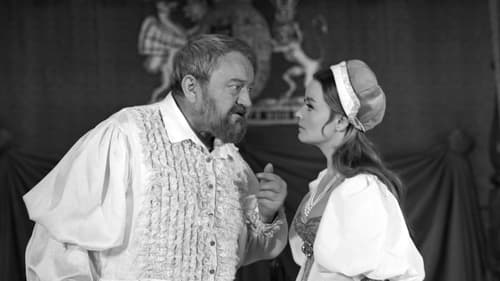
Director

Screenplay
Five Girls Around the Neck, in 1967, set out to explore that critical age of adolescence when a person's character is formed for good or evil. Schorm examined a girl's problems of being giving too much. She tries to buy the goodwill of her less fortunate friends; her intentions are pure, but in the difficulty of communicating she learns envy and deceit, and must decide if she will submit to double dealing or steel her life against self-deception and mediocrity. In addition to the relationship between the girl and her friends, Schorm introduces a teenage romance and the broader relationship between the girl's parents - neatly tied together with segments of Weber's opera "Der Freischütz". He reveals himself as a skilled psychological director with a wide range of knowledge about people.

Director
Five Girls Around the Neck, in 1967, set out to explore that critical age of adolescence when a person's character is formed for good or evil. Schorm examined a girl's problems of being giving too much. She tries to buy the goodwill of her less fortunate friends; her intentions are pure, but in the difficulty of communicating she learns envy and deceit, and must decide if she will submit to double dealing or steel her life against self-deception and mediocrity. In addition to the relationship between the girl and her friends, Schorm introduces a teenage romance and the broader relationship between the girl's parents - neatly tied together with segments of Weber's opera "Der Freischütz". He reveals himself as a skilled psychological director with a wide range of knowledge about people.

A gifted poet checks into a Gothic hotel in hopes of meeting the woman with whom he has long been enamored. He is surrounded by a variety of offbeat characters like the hefty homosexual cook, shadowy clerks, snooty waiters, and valets prone to violence. He finally meets the woman of his dreams only to lose her and ultimately meet with tragedy.

Curate
A gifted poet checks into a Gothic hotel in hopes of meeting the woman with whom he has long been enamored. He is surrounded by a variety of offbeat characters like the hefty homosexual cook, shadowy clerks, snooty waiters, and valets prone to violence. He finally meets the woman of his dreams only to lose her and ultimately meet with tragedy.

Story
Engineer Jan Sebek (Jan Kacer) is undergoing treatment in a mental home after his unsuccessful attempt to commit suicide. His therapist, via discussions both with the patient and with people who know him, tries to find out what made the young and seemingly satisfied man decide to end his own life. Jan's pretty wife Jana (Jana Brejchová) claims not to know about anything but she is conducting an affair with a family friend, almost publicly and with the blessing of her parents.

Screenplay
Engineer Jan Sebek (Jan Kacer) is undergoing treatment in a mental home after his unsuccessful attempt to commit suicide. His therapist, via discussions both with the patient and with people who know him, tries to find out what made the young and seemingly satisfied man decide to end his own life. Jan's pretty wife Jana (Jana Brejchová) claims not to know about anything but she is conducting an affair with a family friend, almost publicly and with the blessing of her parents.

Director
Engineer Jan Sebek (Jan Kacer) is undergoing treatment in a mental home after his unsuccessful attempt to commit suicide. His therapist, via discussions both with the patient and with people who know him, tries to find out what made the young and seemingly satisfied man decide to end his own life. Jan's pretty wife Jana (Jana Brejchová) claims not to know about anything but she is conducting an affair with a family friend, almost publicly and with the blessing of her parents.

Husband
Jan Nemec lleva a cabo una crítica contra el conformismo, la política de masas, el cuestionamiento de la libertad del individuo y las relaciones de patronazgo-clientela en un film que trata de explicar de modo alegórico cómo fue posible la implantación del comunismo en Checoslovaquia. Su carácter subversivo fue la causa de que fuera prohibida hasta la Revolución de Terciopelo de 1989. Fue un poderoso acicate durante las movilizaciones de la Primavera de Praga en 1968. (FILMAFFINITY)
Tu crítica
Puedes escribir una crítica

Self
Documentary about the film academy in Prague and the Czech Film in 1965.

Screenplay
A leading director of the Czech film renaissance provides a philosophical meditation on life and death, set amidst complex hospital apparatus and the sadness, hope, or resignation of the patients. Existentialist rather than optimist, the approach is one of humanistic atheism, accepting death as part of life. Interviews with doctors and nurses explore their outlook; all speak of death as a fact, without either sentimentality or religiosity. The studied objectivity of the film only imperfectly hides an intense emotionality.

Story
A leading director of the Czech film renaissance provides a philosophical meditation on life and death, set amidst complex hospital apparatus and the sadness, hope, or resignation of the patients. Existentialist rather than optimist, the approach is one of humanistic atheism, accepting death as part of life. Interviews with doctors and nurses explore their outlook; all speak of death as a fact, without either sentimentality or religiosity. The studied objectivity of the film only imperfectly hides an intense emotionality.

Director
A leading director of the Czech film renaissance provides a philosophical meditation on life and death, set amidst complex hospital apparatus and the sadness, hope, or resignation of the patients. Existentialist rather than optimist, the approach is one of humanistic atheism, accepting death as part of life. Interviews with doctors and nurses explore their outlook; all speak of death as a fact, without either sentimentality or religiosity. The studied objectivity of the film only imperfectly hides an intense emotionality.
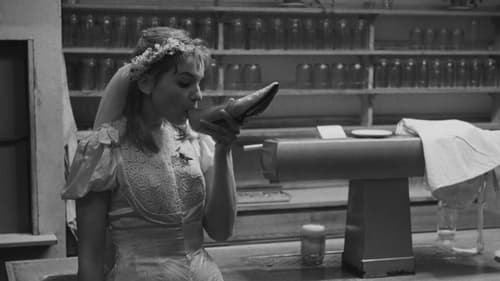
Screenplay
A manifesto of sorts for the Czech New Wave, this five-part anthology shows off the breadth of expression and the versatility of the movement’s directors. Based on stories by the legendary writer Bohumil Hrabal, the shorts range from the surreally chilling to the caustically observant to the casually romantic, but all have a cutting, wily view of the world.

Director
A manifesto of sorts for the Czech New Wave, this five-part anthology shows off the breadth of expression and the versatility of the movement’s directors. Based on stories by the legendary writer Bohumil Hrabal, the shorts range from the surreally chilling to the caustically observant to the casually romantic, but all have a cutting, wily view of the world.
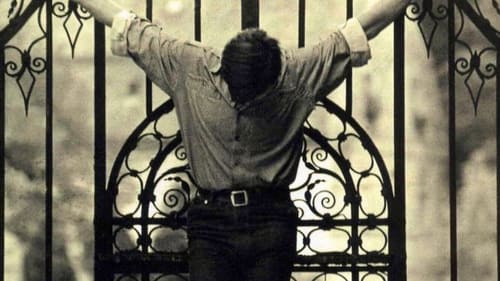
Director
A passionate communist worker is discouraged by the changing political climate and the failure of his peers to live up to his ideals.

Director
A synagogue service in Bohemia, where the Torah scrolls are ceremoniously taken out and read, intercut with images of a Jewish cemetery.

Writer
An exploration of the declining birth rate in the Czechoslovakia.

Director
An exploration of the declining birth rate in the Czechoslovakia.

Director
Documentary portrait of Josef Sudek. The camera captures the famous photographer at work, during walks through the city and nature, waiting for the light. Jan Špáta's black-and-white shots are stylized according to Sudek's photographs.

Screenplay
A short documentary about the work of railwaymen and life on the railway.

Idea
A short documentary about the work of railwaymen and life on the railway.

Director
A short documentary about the work of railwaymen and life on the railway.

Assistant Director
